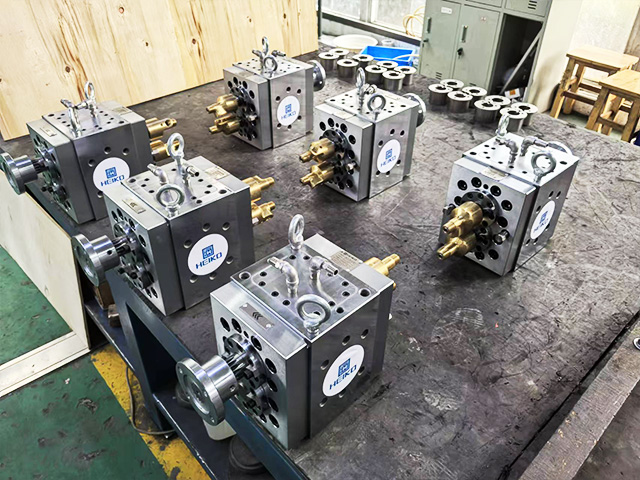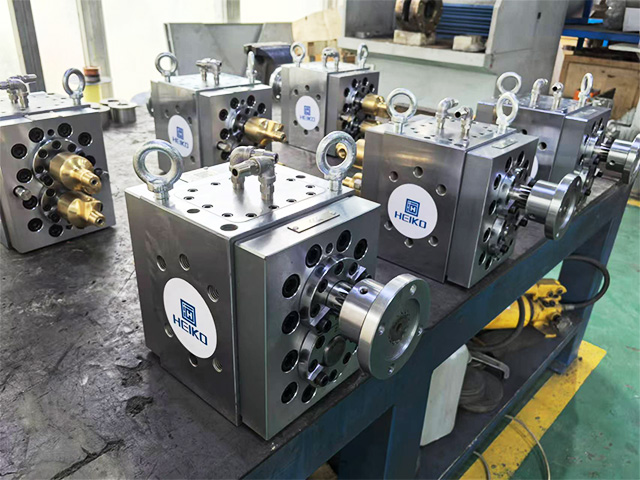What are the other application scenarios of melt pumps in plastic granulation?
Melt pumps in plastic pelletizing application scenarios are very wide, and its key role is reflected in a number of aspects. The following are some of the main application scenarios of melt pumps in plastic pelletizing:
1. Stable conveying and pressurization
Stabilized conveying: Melt pumps ensure a continuous, stable flow of plastic melt during the pelletizing process through their precise control and stable conveying capacity. This helps to minimize production fluctuations caused by unstable melt flow and improves the stability and reliability of the production line.
Pressurization: During the plastic pelletizing process, the melt pump is able to pressurize the melt to meet the extruder's demand for melt pressure. This pressurization helps to ensure that the melt passes smoothly through the die or mold, forming uniform pellets.
2. Precise dosing and control
Precise dosing: Melt pumps provide precise dosing to deliver the melt at a set ratio and speed. This is especially important for plastics pelletizing processes that require precise control of raw material ratios and extrusion volumes. By adjusting the speed and flow rate of the melt pump, precise control of the melt delivery can be realized to meet the production requirements of different products.
Process control: Melt pumps can be used in conjunction with extruders, temperature control systems and other equipment to achieve precise control of the entire pelletizing process. By adjusting the parameters of the melt pump, the extrusion process can be optimized to improve product quality and production efficiency.
3. Apply to a variety of plastic pelletizing process
Versatility: The melt pump is suitable for many types of plastic melts, including polyolefins (such as PP, PE, POE, etc.), polyester, polyamide, etc. This makes the melt pump useful in plastic pelletizing. This gives melt pumps a wide range of applications in the plastic pelletizing industry.
Specific processes: Melt pumps also play an important role in specific plastic pelletizing processes, such as the production of films, sheets, plates, tubes, profiles and so on. It ensures that these products receive a stable and uniform supply of melt during the production process, thus improving the quality and consistency of the product.
4. Improve production efficiency and product quality
Improved productivity: The stable delivery and pressurization of melt pumps helps to reduce downtime and breakdowns in the production process, and improves the operational stability and reliability of the equipment. This helps to reduce production costs, improve production efficiency and product yield.
Improved product quality: Precise metering and control by the melt pump ensures that the extruded plastic pellets have uniform dimensions, smooth surfaces and a dense internal structure. This helps to improve the overall product quality and market competitiveness.
5. Energy saving and environmental protection and sustainable development
Energy saving and environmental protection: The efficient and stable operation of the melt pump helps to reduce energy consumption and emissions in the production process. By optimizing the extrusion process and reducing the scrap rate, melt pumps contribute to energy saving, environmental protection and sustainable development in the plastic pelletizing industry.
In summary, melt pumps in plastic pelletizing application scenarios cover a stable transport and pressurization, accurate metering and control, a variety of plastic pelletizing process, improve production efficiency and product quality, as well as energy saving and sustainable development and other aspects. These application scenarios fully demonstrate the importance and value of melt pumps in the plastic granulation industry.
Email: sale@heikomachinery.com
WhatsApp: +86 13803717447
Previous:PVC 20-110mm double pipe plastic extruder melt pump
Next:In which industries are BOPP film melt pumps most widely used?

